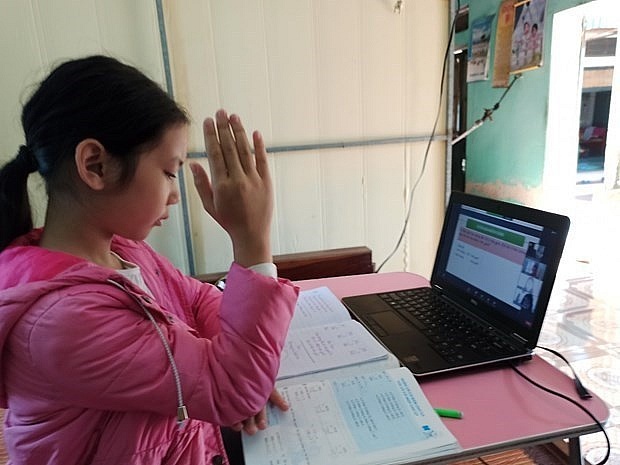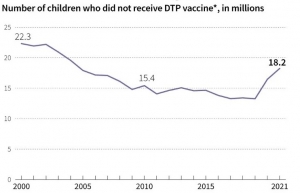INTERNATIONAL INVESTMENT
AND PORTAL
Vietnam is among four countries demonstrating gender parity in digital skills, according to a new UNICEF analysis which was issued on International Day of Girls in ICT (April 27).
 Illustrative image (Source: VNA)
Illustrative image (Source: VNA)
Hanoi - Vietnam is among four countries demonstrating gender parity in digital skills, according to a new UNICEF analysis which was issued on International Day of Girls in ICT (April 27).
When it comes to the gender parity, analysis in internet use among the youth has been achieved in only eight of 54 countries and territories analysed. However, around 90% of adolescent girls and young women do not use the internet in low-income countries, while their male peers are twice as likely to be online.
"Closing the digital pide between girls and boys is about more than just having access to the internet and technology. It's about empowering girls to become innovators, creators, and leaders," said UNICEF Director of Education Robert Jenkins.
"If we want to tackle gender gaps in the labour market, especially in Science, Technology, Engineering and Math (STEM) fields, we must start now by helping young people, especially girls, gain digital skills."
The report entitled "Bridging the Digital Divide: Challenges and an Urgent Call for Action for Equitable Digital Skills Development" takes a close look at the gender digital pide among young people aged 15-24 years by analysing available data on internet use, mobile phone ownership, and digital skills in mostly low-, lower-middle-, and some middle-income economies.
Though more gender-disaggregated data is needed to better monitor, understand, and work toward digital inclusion, the report finds that girls are being left behind in an increasingly digital and connected world.
While advancing access to the internet is important, it is insufficient for digital skills training. For example, in most countries analysed, the share of youth with access to the internet at home is much higher than that of youth with digital skills.
Only in Vietnam and Mongolia is gender parity observed in both foundation reading skills and digital skills, where gender parity is observed in the analysed age cohorts. This indicates that in these countries, both girls and boys aged 7-14 are acquiring foundational reading skills at similar rates, and adolescent girls and boys, as well as young men and women aged 15-24, are acquiring basic digital skills at comparable rates.
However, achieving gender parity does not necessarily imply that the skills are prevalent across the population. For instance, in Vietnam, while 83% of 7-14-year-olds have acquired foundational reading skills, only about 36% of 15-24-year-olds have acquired basic digital skills. Thus, although parity has been achieved, there is still a long way to go before all youth acquire the necessary skills for employment and higher earnings.
Globally, girls are the least likely to have the opportunities to develop the skills needed for 21st-century learning and employment, according to the report. On average across 32 countries and territories, girls are 35% less likely than their male peers to have digital skills, including simple activities like copying or pasting files or folders, sending emails, or transferring files.
The root barriers are far deeper than a lack of access to the internet, according to the report. The findings suggest that educational and family environments play a critical role in the gender digital pide. For example, even within the same home, girls are far less likely than boys to access and be able to make full use of the internet and digital technologies.
Barriers to accessing opportunities to higher learning and the labour market, pervasive discriminatory gender norms and stereotypes, and concerns over online safety may further restrict girls' digital inclusion and skills development.
The report also argues that even when girls have equitable access to gain foundational reading and math skills – and perform on par or better than their male peers – it does not always translate to digital skills. To break the barriers holding girls back, they need early exposure and access to technology, digital and life skills training, and efforts that address harmful gender stereotypes, especially within families, and online violence. Also, only by applying gender-transformative teaching approaches, can barriers towards girls advancement in STEM be broken down, ensuring equal access for all students.
UNICEF is calling on governments and partners to close the gender pide and ensure that girls have the opportunities to succeed in a digital world. Some of the recommendations include teaching digital skills equally to girls and boys in and out of school; protecting girls' safety online through virtual safe spaces, policies and laws, and education; and promoting girls' access to peer learning, mentoring, internships and job shadowing in the digital/STEM world.
 UNICEF vows to support Vietnam in response to Typhoon Noru
UNICEF vows to support Vietnam in response to Typhoon Noru
UNICEF Vietnam expressed its concern over children and families in the country vulnerable to Typhoon Noru, saying it stands ready to support the Government of Vietnam in responding to the most powerful storm to hit Vietnam in 20 years, according to a recent statement.
 UNICEF leader values Vietnam’s achievements in child protection, care
UNICEF leader values Vietnam’s achievements in child protection, care
The Executive Director of the United Nations Children’s Fund (UNICEF), Catherine Russell, highly valued Vietnam’s achievements in child protection and care during a three-day visit to Vietnam that concluded on November 13.
 67 million children missed out on vaccines because of Covid: UNICEF
67 million children missed out on vaccines because of Covid: UNICEF
Some 67 million children partially or fully missed routine vaccines globally between 2019 and 2021 because of lockdowns and health care disruptions caused by the Covid-19 pandemic, the United Nations said Wednesday.
By VNA



















